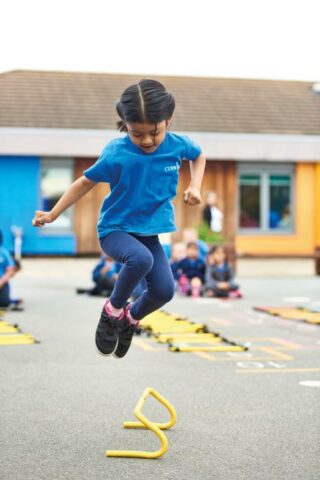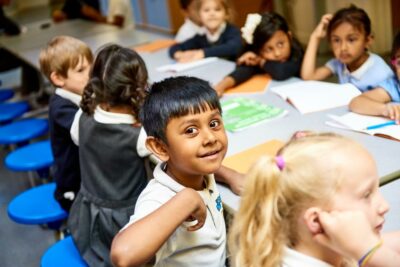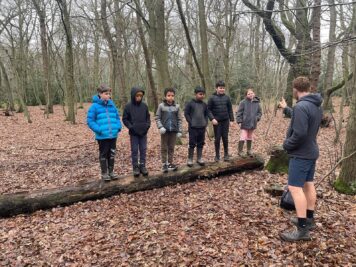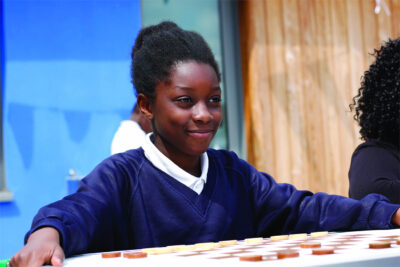Curwen Primary School has achieved the Inclusive School Award with Flagship Status.

Well Above National Average
Curwen is a 4-form entry primary school with a 104 place nursery in the London borough of Newham. Its number on roll is 897. It is one of 4 schools in the Tapscott Learning Trust. Plaistow is an area of high deprivation. There are over 57 languages spoken and 68% of the children speak English as an additional language. Mobility is higher than national average, as is the number of children with SEND. There are 31 pupils with an EHCP, and the school receives higher needs funding for 33 children. Progress and attainment in reading and maths at the end of KS2 is well above national average. OFSTED last visited in 2009 when it graded the school as Outstanding.
The senior leaders believe it is important for home visits to take place for every new student. Staff are then made aware of the child’s domestic situation. The SENCo links with Housing and Social Services and other organisations to assist vulnerable families some of whom live in hotels or whose housing conditions are unfavourable.
The school provides a breakfast club starting at 7.45am Some are invited free of charge whilst others pay 80p a day. Approximately 130 children attend. Some of these children are dysregulated and it helps them to settle into school-life. There is also an after-school club which costs £10 per child per session which closes at 6pm. Again, some children receive this free of charge. Curwen provides food vouchers and holiday care for the vulnerable.
The Development of the Whole Child
The school’s vision statement is about supporting and promoting the development of the whole child. Its aims are to ensure SHINE are practised on a daily basis. SHINE’s aims are to support all children to be successful, healthy and safe, understand and appreciate their identity, feel nurtured and engaged. 
All the staff who were interviewed agreed that this school has a deep understanding of inclusion. They examine the needs of the whole child and ensure that provision is suitable. Vulnerable Children Meetings (VCMs) take place each term. All relevant staff attend and assess each child’s progress and make any suitable amendments to ensure the provision matches the individual’s needs.
Most staff talked about looking at the child’s ‘stage rather than age’ to ensure expectations are realistic. There are three extra classes, Chestnut and Oak and sometimes Sycamore. Chestnut is a class for 7 children with extra needs in Reception, 6 of whom are non-verbal. There is lots of explorative learning with sensory activities. The staff are highly trained and have a deep understanding of the needs of each child.
Oak is an adaptive provision for 10 KS1 children following the EYFS curriculum, most of whom have EHCPs. Sycamore is an adaptive class for children in KS2 targeting improving literacy and maths skills.
There is a targeted reading intervention programme at lunchtime; handwriting interventions for those who need extra support to form their letters correctly and there is a dyslexia programme which runs across the school to assist children with their phonics, spelling, reading and comprehension. There is a Team Teach Trainer to ensure all staff use a common and consistent vocabulary and approach. A Speech and Language therapist comes in every Friday. Some staff are trained to support children with Pathological Demand Avoidance (PDA).
Staff Are Very Caring
The staff at Curwen are very caring. There is little staff mobility, many of whom have been here a long time. They donate food to the breakfast club and recently organised an appeal for the victims of the Turkish earthquake disaster raising over £1,700. This is not an affluent community. Pupil Premium funding goes on subsidising trips. Year 4, 5 and 6 children are offered the opportunity to attend residential trips to the Lake District and Fairplay House in Essex.
Curwen is fully accessible for those with physical needs. There are currently 3 children with hearing needs, some of whom attend the Hearing Resource Provision. The school has a close working relationship with the sensory service. There is a sensory room and a London Bus in the playground where colourful semantics is taught. It is also used for art, and music therapies.
Embracing the Needs of Every Child
This school thinks carefully about embracing the needs of every child. There are Language enrichment groups, Box Clever groups and Social Skills groups. All children learn to swim but there is also swimming for an inclusion group. All the students know about the Zones of Regulation and what they might do to get back to the green zone. There are Headstart Champions and Chill and Chat sessions. There are 20 staff who are trained Mental Health First Aiders. A Mental Health Practitioner comes in once a week and works with parents of emotionally dysregulated children.
 The Safeguarding team consists of 6 trained members of staff. They decide who will be best to speak to certain children and they attend the VCMs at the end of each term. They run the Positive Parenting Programme (Triple P) and the Stepping Stones Programme for children with additional needs. A Child and Adult Mental Health Services (CAMHS) practitioner comes in once a week to work with certain parents.
The Safeguarding team consists of 6 trained members of staff. They decide who will be best to speak to certain children and they attend the VCMs at the end of each term. They run the Positive Parenting Programme (Triple P) and the Stepping Stones Programme for children with additional needs. A Child and Adult Mental Health Services (CAMHS) practitioner comes in once a week to work with certain parents.
The children are proud to attend Curwen. There is a strong buddying system to assist new pupils when they start life here. They know that staff are always here for them, ‘They never turn us away, they always have solutions.’ They like using their Chromebooks in lessons and they like the wide variety of clubs that are on offer.
Pupils think the rewards system is appropriate and varied from receiving Dojos, stickers, prizes and certificates. They like the Pupil of the Week award and receiving gold stars. They understand the sanctions system where all children start on green. If they misbehave, they might receive a warning and go onto amber and then red where they go to the Restart area to reflect on their behaviour. If relevant the victim will be asked what they want to happen to the perpetrator. They will meet a member of the Mental Health team who will assist them to fill out a form and help them regulate their emotions. The pupils think they are understanding and show empathy.
Strong Network of Schools
There is a strong network of schools in Newham which drive certain key policies i.e., PHSE and RSE. There is a commonality between these schools as they share similar problems and issues. Curwen embraces the Education 4 Change (E4C) philosophy. Most children will be learning about Significant Figures which embraces gender, cultural, disability and race issues e.g., tackling why certain women do not work or respecting gender identity etc. There is a culture here of speaking up when ‘unkindness’ occurs. Children and parents are made aware of the consequences. Curwen does not take part in Anti-Bullying Week as it is woven through the curriculum, it has a Kindness Week instead. Parents feel that their children are safe here. They know that bullying will be confronted and dealt with. The Anti-Bullying Policy is in child-friendly talk.
 The parents think that communications between themselves and the school is very good. They like the Study Bug app which makes communications easy. They said that since their children have started here, they have made remarkable progress. They know that children who need extra support receive it from highly trained staff. They said their children are happy here and are enjoying making costumes for Carnival next week when parents will be invited in. They have attended science week and lots of other events. They often meet their child’s teacher in the playground.
The parents think that communications between themselves and the school is very good. They like the Study Bug app which makes communications easy. They said that since their children have started here, they have made remarkable progress. They know that children who need extra support receive it from highly trained staff. They said their children are happy here and are enjoying making costumes for Carnival next week when parents will be invited in. They have attended science week and lots of other events. They often meet their child’s teacher in the playground.
The school has Democracy Week in September. School Council elections take place each year and each class have a class charter. The older children learn about leadership and what a dictatorship looks like. Some have been to Parliament and City Hall. They have been to Battersea Park and the British Museum.
The Senior Management Team identify the needs and who will be best to address them. The staff are highly trained and very supportive of each other. All Teaching Assistants receive training every Friday afternoon. Training is usually disseminated through the staff if it is relevant. A specialist teacher from the Trust comes in to assess why some children’s behaviour is displayed. She uses the Autism Diagnostic Observation Schedule (ADOS). She understands that it is a form of communication, and the child might not know how to ask etc. One member of staff said that Curwen offers the most opportunities in the borough. ‘Staff here go the extra mile; they are committed and on the same wavelength.’
‘We Can All Contribute’
The reason why Curwen is successful is because there is a culture that promotes a sense that everybody can take part, ‘we can all contribute.’ The Head of School believes that every child’s needs must be met. The SHINE principles are displayed in every class and the Senior Management Team ensure they are relevant and constantly revisited.
 The governors receive ongoing training, there is a sense of mutual support here. The governors support the staff, and they support the governors by providing them with the relevant data and reports. The parents support the work of the staff, and they support the parents. What underpins all of this is that the Head of School has made it accessible for everybody. The CEO of the Trust appointed an ADOS specialist teacher, and this has sped up the process of applying for an EHCP. Curwen’s leadership identifies the needs and priorities of its community and works hard to appoint the best person to address them.
The governors receive ongoing training, there is a sense of mutual support here. The governors support the staff, and they support the governors by providing them with the relevant data and reports. The parents support the work of the staff, and they support the parents. What underpins all of this is that the Head of School has made it accessible for everybody. The CEO of the Trust appointed an ADOS specialist teacher, and this has sped up the process of applying for an EHCP. Curwen’s leadership identifies the needs and priorities of its community and works hard to appoint the best person to address them.
The reason why mobility of staff is low is because there is mutual respect and staff, children, parents and carers are happy here. Our Assessor concluded, “From everything that I have seen I recommend that Curwen continues to receive the Inclusion Quality Mark. It is a school which examines the needs of all its children and ensures that those needs are met.”
Find out more about the IQM Inclusive School Award
If your school is interested in obtaining the IQM Inclusive School Award or you wish to talk to a member of the IQM team please telephone:
028 7127 7857 (9.00 am to 5.00 pm)
or email: [email protected] for further details.
Want more information on the IQM Award? Click here to request your free IQM information pack.